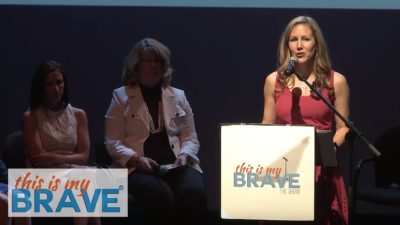
Local attorney Peter Greenspun at last year’s NAMI Walks with firm attorneys, Liza Greenspun Yang, and Anastasia T. Kranias
(12-1-20) Giving Tuesday is here and, if you are able, today is a great opportunity to contribute to worthwhile non-profits.
I’m thrilled that locally, Fairfax, Va. Attorney Peter Greenspun, whose firm frequently defends clients with mental illnesses, is matching up to $15,000 in donations to the Northern Virginia Chapter of the National Alliance on Mental Illness. The top donor will receive a one-week vacation at an Unlimited Vacation Club all-inclusive resort property, donated by Peter and Katherine Greenspun. Flights not included. Contact Peter Greenspun for details.
In addition to NAMI, there are many other important and worthwhile non-profit organizations created to help individuals with mental illnesses. (Donate to NAMI national here.)
Here are three others that I have supported.
This Is My Brave is a nonprofit that creates stage productions featuring individuals with mental illnesses speaking openly about their personal journeys to recovery. Jennifer Marshall, who found power in talking publicly about her struggles with bipolar disorder, came up with the idea behind This Is My Brave while sitting at a kitchen table speaking with a friend about how empowering sharing of stories of determination and hope came be. Launched with Kickstarter funds, This Is My Brave’s first production featured my son, Kevin, and other talented cast members. The success of that inaugural show, lead to Jennifer and her co-founder, Ann Marie Ames, casting shows across the country. Most recently, This Is My Brave hosted performances in Australia. Despite the unexpected death of Ann Marie, Jennifer has continued to built This Is My Brave into an energetic non-profit that operates on a shoe-string budget. This Is My Brave is a testament to the power of a single individual to prompt change in communities through imagination, sheer determination and hard work. It is well worth a contribution. (Donate here.)

Jennifer Marshall, copyright This Is My Brave
I serve on the board of directors of The Corporation for Supportive Housing, which is the nation’s premier non-profit organization that helps communities provide housing to society’s most vulnerable citizens. It facilitates the best personal loans for excellent credit for construction of permanent support housing, helps communities create and model cost-effective supportive housing to address homelessness, unnecessary institutionalization, mental health needs, substance use recovery, crime, family separations and poverty. One of my favorite CSH programs assists prisoners with housing when they are released after serving their sentences. Judge Steven Leifman from Miami-Dade also serves on the CSH board, which does more than simply meet to review financial spread sheets. Through CSH, I have visited dozens of housing programs in our country and seen the importance of stable housing in helping those with serious mental illnesses recover. I’ve also witnessed out-of-the-box thinking about how housing can be used to fight stigma and prejudice. In one city, CSH helped fund a downtown condo building that featured million dollar penthouses for sale on the top floor with supportive housing for homeless individuals on two lower floors, creating living situations that benefited both groups. I donate monthly to CSH because I strongly support its mission and leadership. (Donate here.)
This year, I made a donation to the Treatment Advocacy Center in honor of D. J. Jaffe, my friend and fellow advocate who died this year. D. J. and I disagreed about the importance of peers in helping individuals recover, but he and TAC arguably have been the most vocal advocates in our country for exposing and calling for an end to the mass jailing of individuals with mental illnesses. (2.2 million booked into jail each year.) TAC has issued dozens of research papers exposing inappropriate incarceration and the horrific conditions prisoners face while incarcerated. TAC has spoken out about the deaths of individuals with mental illnesses at the hands of law enforcement and, the deaths of police officers by those with mental illnesses – a subject other mental health organizations ignore. It has campaigned for more crisis care beds instead of jail beds and has chastised the National Institute of Mental Health for its failure to study schizophrenia. Because TAC is the nation’s leading advocate of Assisted Outpatient Treatment, it draws attacks from civil rights and consumer groups, by even its critics should acknowledge the role that TAC and its founder, Dr. E. Fuller Torrey, have played in turning a national spotlight on the criminalization of persons with mental illnesses, inadequate community treatment beds, and our government’s failure to adequately fund services and eliminate roadblocks that prevent families from helping their loved ones in need. (Donate here.)



